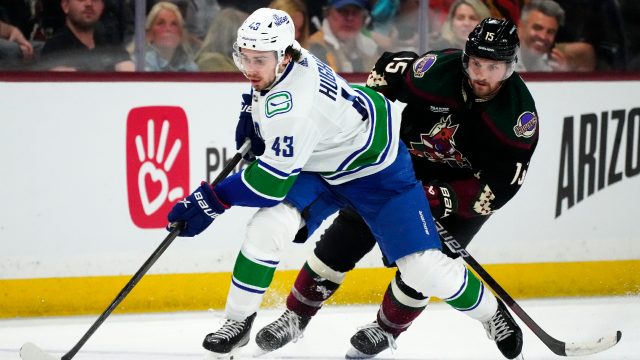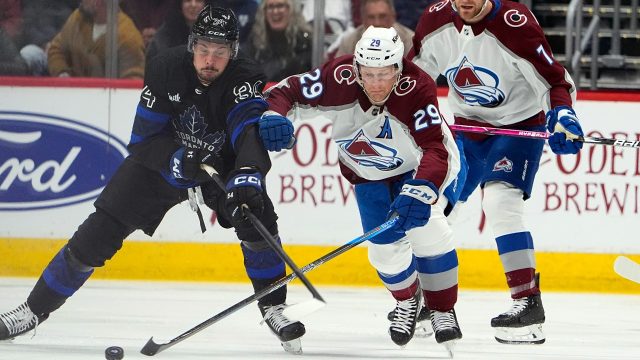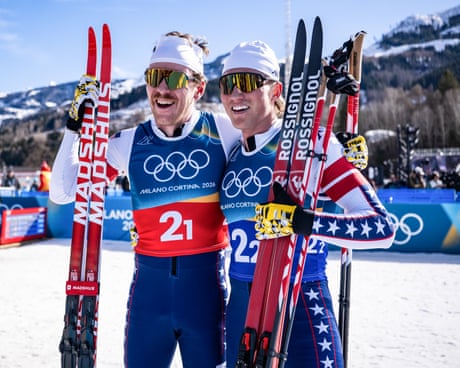
The Vancouver Canucks are going back to the Stanley Cup playoffs, and so is their president, Jim Rutherford.
An architect of championship teams in Pittsburgh and Carolina, Rutherford has already won three Stanley Cups. The Canucks, you may have heard, are still looking for their first.
Just 15 months since chaos ended in Vancouver with the hiring of coach Rick Tocchet to complete the re-alignment of Vancouver’s hockey operations department – and less than 2 ½ years since Rutherford took charge – the Canucks are not only a playoff team, they have 102 points with six games remaining and are inching towards their first division title since 2013.
With the National Hockey League playoffs just over two weeks away, Sportsnet talked to Rutherford about what this all means, where the Canucks go from here, the Stanley Cup tournament to come and other topics. Our interview has been edited slightly for clarity and brevity.
SN: What does it mean to you to be taking the Canucks back to the playoffs?
JR: It means a lot to me. That’s what we’re here for, that’s what we work for, that’s what everybody wants. And once you get in the playoffs, any team has a chance to win a Cup — once a team gets on that good roll, and starts to feel really good, very confident, and gets all the breaks. I’ve certainly been in Vancouver long enough to understand the frustrations of people over the years here. I probably feel happier for the people that have been here and have been frustrated more than I do for myself.
SN: What has impressed you the most this season?
JR: There are a number of things. But the thing that really got us started was the focus that Rick put on preparation for the players in the offseason, leading up to camp, having a good camp, having a good start and buying into the system. So I’m pleased with. . . the working relationship that the coaches and players have and how well they have worked together.
SN: The level of success in the regular season, 100-plus points and first place in the Pacific Division the last three months, has surprised everyone. Why do you think this success is sustainable next year and beyond?
JR: I believe that this is just the start. I believe that this team can continue to grow and get better. As you know, there’s a lot of players that are in a situation now (going into the playoffs) that they haven’t been in before, and sometimes it takes a year to learn from your successes and your failures before you really get to where you want to get to. But the fact of the matter is our impact players are still in their prime. And we have to do a good job of retaining the players that have helped this team win, and if we can’t do that, replacing them properly. One advantage that we have — and I give our staff a lot of credit — is our development system and what’s going on in Abbotsford (in the AHL). There’s a handful of players there now that are very close or ready to make the next step and play in the National Hockey League. So that’s another advantage we have when you talk about where this team could go in the future.
SN: When you hired Tocchet, you took a step back from the media spotlight. Your general manager, Patrik Allvin, seems to have taken three steps forward. What do you think of his performance?
JR: He has grown very quickly. But there’s nothing going on that surprises me. The advantage I had is that I’d worked with Patrik before. I knew him personally. I knew how hard he worked. I knew how knowledgeable he is about hockey players, not only in North America but throughout the world. And I knew how he works with people on his staff. He’s done a terrific job in a very short period of time.
SN: The elephants in the room regarding playoff inexperience, especially among your core players, is multiplying as we get near the end of the regular season. How much of a handicap could this be in the playoffs?
JR: It can work for you and it can work against you. You don’t know what’s coming your way. The best way to win at any time is to play your own game. Do what you do best. So that can work in your favour. The inexperience can work against you if, in fact, the pressure is too much for certain players. But until you get into it, you don’t know.
SN: We talk every year about the expanding number of teams that could win the Stanley Cup. But have you ever seen a field like this, without an overpowering team but 12 or 14 that look capable of winning?
JR: I think (parity) is just more obvious this year. If you go back to last year, the Florida Panthers got in the very last game of the season and went right to the finals. They could have won the Stanley Cup. One of the years we won in Pittsburgh, Nashville had to win their last three games to get in, and they took Pittsburgh to Game 6 of the finals. You say 12 or 14 teams, but every team that makes the playoffs has a chance to win the Stanley Cup. They got to the position in different ways. But whatever team gets on a roll, they’re going to win.
SN: Starting goalie Thatcher Demko (knee) has resumed practising, and Elias Lindholm (wrist) is also on this road trip. But with so few games remaining in the regular season, are you concerned you won’t have your best team ready for the playoffs?
JR: I’m not concerned at all. I’m actually glad that we’ve dealt with some adversity. We’re definitely going to deal with some in the playoffs. But, you know this, this team did a lot of good work in the first half of the season. And I believe we have a better team now than we did in the first half. But we’ve dealt with certain issues. The (challenging) things that have happened to us are going to only help us in the future.
SN: Speaking of challenges, what is happening with Elias Pettersson? As Tocchet has noted, Pettersson is not the only Canuck struggling to find his A-game. But he is easily the most talented and important one.
JR: Yeah, he’s not himself, but he’s still doing OK. It’s going to go that way for players — different players at different times. This is something that he’ll come out of. Sometimes when it doesn’t go your way, you may press a little bit more and you’re just not as relaxed and as comfortable. But he’s a terrific player, and I’m certainly not concerned about where he’s at.
SN: Is it too early to talk about UFAs? You have nine players on your roster eligible for unrestricted free agency and we know you’d like several of them back. How soon might we see some of your top UFAs re-signed?
JR: We don’t feel that there is a panic to get them signed because I’ve always felt that if a player wants to play with a certain team, they’re going to sign with them even if it’s two days before free agency. Or even if it’s after free agency (opens) if a player really wants to stay in Vancouver and play for the Canucks. But there’s been talk with some of the agents of the players that we have now that if they come back to us and said they want to get signed, it’s possible somebody could sign before the playoffs.
SN: The timing seems tricky because you obviously don’t want players distracted when the playoffs are starting. And isn’t there a possibility of contract envy if you re-sign one or two now and not others?
JR: That’s what they all think. And that’s fair on the players’ part. But you can’t get all these guys signed. And it should not be a signal to a player that because one guy gets signed, it doesn’t mean that we don’t want that player. We just have to be patient.
SN: Is it fair to say that Dakota Joshua is at the top of your list?
JR: Yes, I would say he’s a priority for us.
SN: Has there been any developments regarding restricted free agent Filip Hronek?
JR: There’s nothing I can tell you contract-wise other than the fact that we like this player and he has brought a certain element to this team and helped us get to where we are. But he’s also a free agent that will be on the upper end of the scale as far as a cap hit. Hopefully we can figure out something at some point in time.
SN: How careful do you need to be about term for Hronek – or anyone? Brock Boeser’s contract is up after next season, Thatcher Demko has two years remaining and your captain and MVP, Quinn Hughes, is up in three.
JR: We do projections on a weekly basis. It almost gets tiring sometimes because we go over and over the same thing. But our projections cap-wise go out as far as the year we have to sign Quinn.
SN: How much work have you left to do building this team?
JR: You have to work at it all the time. You’re always going to have some changes with players. Even teams that win the Stanley Cup don’t come back with the same team. We always have work to do. Maybe we’ll look at getting more production from our wingers, whether we project some guys to do better next year or we have to go out and get another winger or two that can help us on the offensive side.






